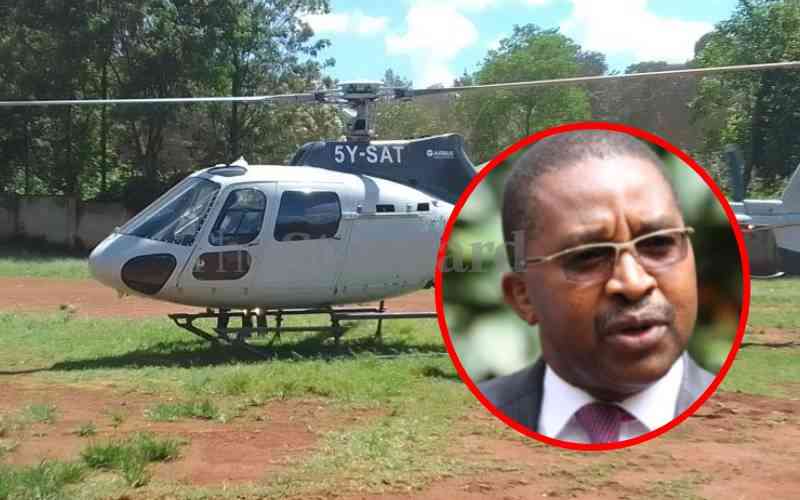Kenyans are a hypocritical lot. Whenever results of an opinion poll that tells us nothing new are released, the feigned shock across the land is so palpable you can touch it.
Just this week, we ‘discovered’ that head teachers steal school cash. We were also shocked to hear, as if for the first time, that school kids are quaffing beer with relish. Not long ago, there was even greater shock when we learnt the youth see no problem with getting rich through bribery.
It is a cultural trait you also see when you are flagged down by a traffic police officer on Thika Road.
If you affect the airs of a church-going moral purist and have been driving a little too fast, the officer will cup his mouth with his palm in mock horror and say something like, “Do you know the risks of driving at such a high speed and how many lives you are endangering?”
The feigned concern does not even remotely betray the fact that the same uniformed paragon or moral rectitude has been pocketing crumpled Sh50 notes from kamikaze muguka Probox drivers driving at a death-wish speed.
Now take the case of young college girls and fresh graduates who hop from club to club bankrolled by sponsors. In case you have no idea, a sponsor is a rich man, mainly an old balding man with marriage and even fecundity issues who preys on impressionable girls who want to live beyond their means. The comical thing is that to hear a Kenyan politician or top businessman lecturing university students on moral values, you would never think politicians, with their easy cash, have anything to do with this sponsor business.
Human nature is such that we all make mistakes. But in Kenya, we wait for the storm to abate and go back to hypocrisy and denial.
Tragedies and calamities should shake our conscience and consciousness and point us to the folly of the paths we may have chosen to take in the past. A case in point was the post-election violence of early 2008 and the subsequent cases at the Hague. While the calamity of violence and the attendant cases shook the unity of the nation to its very foundation, it also presented us with a moment of introspection.
Wise people, when engulfed in bouts of sorrow and trepidation, turn away from their crooked ways, shake off the dust and soldier on. It is called falling forward and is premised on the inspiring belief that success is a series of falling and waking up. As the country seeks consensus on sticky issues such as the fate of the Independent Electoral and Boundaries Commission (IEBC) and other national challenges, perhaps it would be wise to remember that the challenges we have today can be linked to some leadership blunders of the past.
Put in another way, perhaps we could have avoided the 2008 violence, or even averted a situation where we would today be considering repatriating refugees. But the most important thing should be to ensure we don’t make those blunders going forward.
Just this week, I read somewhere that President Uhuru Kenyatta should break the law to unlock the IEBC stalemate. The justification for that suggestion was simply that he has got away with it in the past.
While I’d be the first to admit we need to do everything to solve our numerous challenges, it would be abhorrently wrong to assume repeating the mistakes we have made in the past will guarantee us a better future. It is akin to asking someone who seeks to escape bankruptcy to borrow more and do what he did with his cash in the past.
Societies and organisations get better by learning lessons and making the right decisions in future. They get even better by refining their systems; isolating and avoiding past mistakes and enhancing the master strokes.
 The Standard Group Plc is a
multi-media organization with investments in media platforms spanning newspaper
print operations, television, radio broadcasting, digital and online services. The
Standard Group is recognized as a leading multi-media house in Kenya with a key
influence in matters of national and international interest.
The Standard Group Plc is a
multi-media organization with investments in media platforms spanning newspaper
print operations, television, radio broadcasting, digital and online services. The
Standard Group is recognized as a leading multi-media house in Kenya with a key
influence in matters of national and international interest.
 The Standard Group Plc is a
multi-media organization with investments in media platforms spanning newspaper
print operations, television, radio broadcasting, digital and online services. The
Standard Group is recognized as a leading multi-media house in Kenya with a key
influence in matters of national and international interest.
The Standard Group Plc is a
multi-media organization with investments in media platforms spanning newspaper
print operations, television, radio broadcasting, digital and online services. The
Standard Group is recognized as a leading multi-media house in Kenya with a key
influence in matters of national and international interest.








